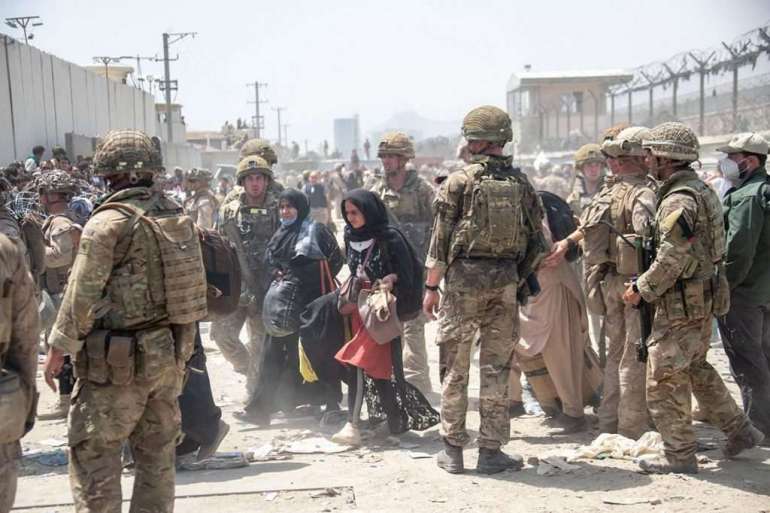Biden sticks to Aug. 31 withdrawal from Afghanistan

“I remain not confident that we can get it done,” Rep. Jason Crow (D-Colo.), a former Army Ranger who served in Afghanistan, said after a classified briefing with senior administration officials on Tuesday. “There are more of those folks in Afghanistan right now than we have the capability to evacuate between now and the end of the month. That’s why the mission must be extended.”
Nevertheless, the administration has projected confidence this week that it will be able to safely shuttle all Americans seeking to flee Afghanistan out of the country by Aug. 31. And although the administration has not guaranteed the same timeline for endangered Afghans who aided the two-decade U.S. war effort, Biden has similarly pledged to evacuate those Afghans who also want to leave.
“We believe that we have time between now and the 31st to get out any American who wants to get out,” national security adviser Jake Sullivan told reporters at a White House news briefing Tuesday.
One group likely to be pleased by Biden’s decision is the Taliban, which has made clear its desire for the U.S. to adhere to the Aug. 31 withdrawal deadline as it cements control of Afghanistan. The militant group has also taken steps to prevent Afghans from leaving the country.
Taliban spokesperson Suhail Shaheen told Sky News in an interview Tuesday that “there would be consequences” if American forces did not leave by the end of the month, warning that an extended U.S. troop presence would “provoke a reaction.”
Still, the Biden administration is preparing several contingency plans, according to lawmakers who attended Tuesday’s briefing, in the event that Biden decides to extend the withdrawal deadline past Aug. 31.
“You need to have a plan to go past the 31st, and they assured me that they do,” House Armed Services Committee Chair Adam Smith (D-Wash.) said. “Absolutely there’s a risk [of maintaining a troop presence past Aug. 31]. And that was the purpose of my question, to mitigate that risk as much as possible — work with the Taliban wherever they can, to give us a little bit greater flexibility.”
A contingency plan, Smith added, “looks very similar to what we’re doing right now.”
“Once we decide to end the mission, that’s going to be a very difficult, tricky, and risky operation to finally pull everybody out,” he added.
Although Sullivan asserted Tuesday that “it will be the president’s decision how this proceeds, no one else’s,” administration officials have acknowledged in recent days just how much the U.S. evacuation effort has depended on close communication between American and Taliban officials.
In the latest sign of that coordination, CIA Director William Burns secretly met with Taliban leader Abdul Ghani Baradar in Kabul on Monday, The Washington Post and other news outlets reported Tuesday.
On Tuesday morning, shortly before news broke of Biden’s decision to maintain the Aug. 31 deadline, Pentagon spokesperson John Kirby told reporters at a news briefing there had “been no change to the timeline of the mission” in Afghanistan.
Meanwhile, Taliban spokesperson Zabihullah Mujahid told reporters at a news conference that the militant group was “not going to allow” Afghans to leave the country, as Biden met virtually with G-7 leaders to discuss the situation in Afghanistan.
Biden first publicly entertained the idea of postponing the evacuation deadline in an interview with ABC News last Wednesday, when he said that if there were “American citizens left” on the ground after Aug. 31, “we’re going to stay until we get them all out.”
In an April speech announcing his plans to pull the U.S. military out of Afghanistan, Biden initially pegged Sept. 11 — the 20th anniversary of the 9/11 terrorist attacks — as the date by which American forces would be withdrawn.
In a subsequent address last month, Biden revised that withdrawal deadline to Aug. 31.